Jeremie Averous's Blog, page 156
January 28, 2012
I am not what has happened to me. I am what I choose to become
This quote from Carl Jung is powerful. And so true.
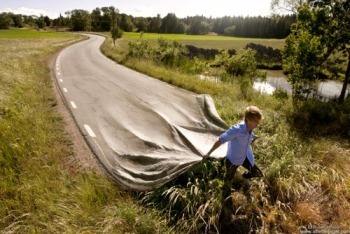
Create your own way!
Our personal responsibility is immense to decide on what we focus on, what we do, what we choose. Most of us choose to let ourselves being carried away by the events of life.
We are not our past. We have to choose our future and this is not determined by our past.
It is our personal responsibility to become what we want and we should not shy away from it.
This personal responsibility is scary. It is challenging. Yet it is what makes us human beings.
With the Fourth Revolution, more people than ever before have more choices. Yet we are not educated, supported in making these choices: in the Industrial Age, somebody else was doing these choices for you.
The Fourth Revolution is the time and the opportunity for you to make a choice. To choose what you want to become. Not how you would like the world to see you: what you really want to be for yourself.
It is not anymore a lonely quest. Connect with the world and become what you choose to be. It is pressing. Start today. Because if you don't make that choice, you will let the world pass on and disappear in insignificance.
Do it. For yourself. For the world.

January 26, 2012
Choosing one's destiny is like deciding to exit a train
I am not what has happened to me. I am what I choose to become - Carl Jung.
As I was about to write this post about destiny and choice I immediately thought about putting a very conventional picture like this
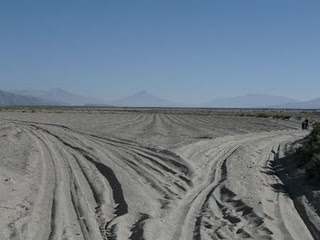
which road do you choose?
Which is just a nice way to express this choice problem, basically expressed by the following powerpoint – management presentation type drawing:

Decision point
But after some thought, I realized that this is not how it happens in life. It is not like you wake up some day and face a decision, which you have to take in any case. It is far more like being carried away on a train and deciding whether or not we should go down at the next station to start something anew, like this

will you go out at the next station?
I like the metaphor because obviously you don't want to jump out of the train just at this moment where the train is on the bridge. Yet if you want to decide on your destiny you need to decide when and how you'll disembark from the train of life you've taken a few years ago. Beware, if you don't decide, where it could bring you. This man seems to be resigned to where he is being carried away. Don't be like him!
Think about it. Will you choose to exit your train at the next convenient point? Will you force yourself to go against the comfortable train trip to discover new horizons?

January 24, 2012
What can we learn from Jonathan's Starbucks card experiment?
Did you hear about Jonathan's starbucks card experiment?
It's quite a simple experiment with deep learning in crowdfunding.
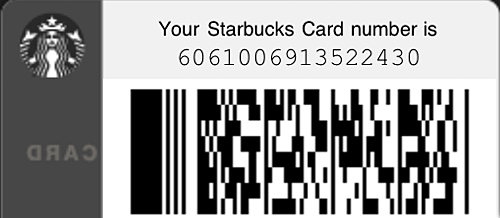
Jonathan's Starbucks card
Jonathan made his starbucks card available to anyone on the internet. Anyone could buy a coffee with it. And anyone could put some money on it.
Although it was not intended to be that, the experiment ended up experimenting whether people would refill the card by how much. The experiment is detailed in this post on O'Reilly: "Jonathan's card: lessons from a social experiment".
Guess what happened?
It became a social media event, using a twitter account that broadcast the card's balance live.
Here's an extract of the card balance curve.
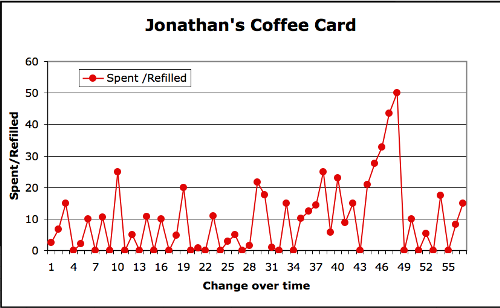
Jonathan's Card refills
See, people almost never refill before it goes to zero. But then they refill with a large amount.
Would we tend to use FREE until there is no more, but then be generous as we are in fact participating to a social event?
This pattern is often identical when people that know each other share a single resource and need to refill sometimes. What is astonishing here is that it happened with people who did not know each other. Yet they must have had a sufficiently strong emotional connection through their participation to the social network.
It just shows that communities that are emotionally connected over social networks behave like communities that are face-to-face in real life. Over considerable distances, community behavior develops. Social networks really break the distance factor!

January 22, 2012
Gong Xi Fa Cai! To celebrate the Year of the Dragon, the Fourth Revolution is free on Kindle for another 48h!!
2012 – the Fourth Revolution year of the Dragon!
After the tremendous success of the first Kindle promotion of the Fourth Revolution, to celebrate this new year – the Chinese new year, the Fourth Revolution book on Kindle is free for another 48 hours only!
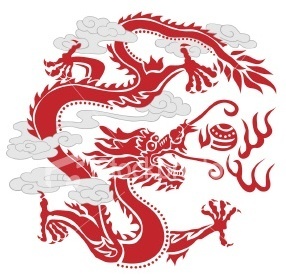
Are you ready for the year of the Dragon?
The Fourth Revolution on Amazon.com's Kindle store
The Fourth Revolution on Amazon.co.uk's Kindle store
The Fourth Revolution on Amazon.fr's Kindle store
The Fourth Revolution on Amazon.de's Kindle store
Read the Fourth Revolution book and change your life!
Happy new year 2012! Slain the dragons in your life!
(the promotion starts on January 23 at midnight California time, i.e. around noon in Europe and late afternoon in Asia, for 48h straight)

January 21, 2012
The real story of K.E.E.N.'s motivation
The K.E.E.N. is not anymore motivated by money. She wants to have fun, to bring something to the world, to prove herself.
One of the best stories I found is the story of the development of Apple's graphing calculator.
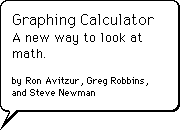
Apple's graphing calculation application
Or, how two engineers, against all odds, against Apple itself, have worked hidden for a number of months in Apple's offices, unpaid, to create a great product.
January 19, 2012
The Fourth Revolution wrecks the society in which it occurs
The title of this post is directly inspired by this quote:
"The major advances in civilisation are processes that all but wreck the societies in which they occur"
- Marshall Mc Luhan, in "The medium is the massage", 1967
This prescient quote by a visionary author is directly applicable to the Fourth Revolution, a major advance in civilization. The storm of the Fourth Revolution is upon us. Society will undergo a tremendous change. Are you ready?
[source of the quote: "thinking about the social enterprise", a blog post by JP Rangaswami]

January 17, 2012
How Eric Schmidt (Google) was almost right, but not quite
"Every day we produce as much content as was produced by all of mankind for the 20,000 years before 2003″ [Eric Schmidt, former CEO, Google] (quote from Seth Godin's book 'we are all weird')
Actually this quote is wrong. This content is not only produced. It is published. And that's what makes the difference.
Think about it.
Think about that incredible amount of information at our fingerprints.
And think about how easy it is today to access and find any kind of information from anywhere in the world.
Latest stats from Facebook: more than 250 million photos uploaded every day, 800 million users, half of which connect every day. Twitter: 300 million tweets are sent every single day. There are millions of blogs. 135 million professionals on LinkedIn.
"Every day we produce as much content as was published by all of mankind for the 20,000 years before 2003″
And you're still not a believer of the Fourth Revolution?

January 15, 2012
Video of the month: insights by Seth Godin on the K.E.E.N. skills – and the importance of failure
Building on failure is another skill of the K.E.E.N. This interview of Seth Godin is a real eye-opener on the power of failure, and in general, the skills of the K.E.E.N.
Seth gives also deep insights on the new world that is awaiting us: remember – the concept of climbing the career ladder is bust !
Find other inspiring resources and videos in the Fourth Revolution Resource Center, in the page on K.E.E.N. – related resources.

January 14, 2012
How to create a great venture: have a scaling plan from the beginning
In a previous post we discussed the differences between Freelancer and Entrepreneur.

How will you scale?
The fundamental difference is about succeeding in scaling the activity.
Scalability is difficult. In the book Founders at work: stories of startups' early days, which accounts many stories of IT and internet startups, most if not all stories revolve about the problem of physical scaling, e.g. servers and databases. When a service becomes successful, a single server is not enough; you need more, and then the scalability problems start, because you need to synchronize everything seamlessly. Those startups that succeeded managed their scaling problem quickly and efficiently enough.
Similarly, many startups need to overcome the process scalability problem: how to reproduce, or model, a successful pattern of work set by the founder.
Because scaling is indeed a very difficult problem, some people just decide it is better to avoid it. For example, in the field of consulting, Alan Weiss (author of "million dollar consulting" and many other bestsellers) is adamant that it is much better to work for one's own rather than bother trying to manage others or trying to scale into a full-fledged consulting practice. He prefers to have alliances and subcontractors when he needs more production power.
The problem is that by avoiding the scaling issue, you will never effectively build an entity that will have a life of its own (you will never be an 'Entrepreneur'). You will not benefit from the value of leveraging a group of diverse talents to achieve a given goal. You will not be able to spread geographically, or to touch a large number of people with your great service or message. In brief, you will fall short of your potential impact on the world.
So, scalability is a problem that should be dealt with upfront, together with the business plan or other planning considerations for the new venture. A scaling plan needs to be put in place so that the infrastructure, the organization, the processes, take into account scalability from the beginning.
Don't shunt this step out of the preparation. Work out your scaling plan today!

January 12, 2012
Facebook today is the internet of 2004
Do you believe things change quickly? Facebook, today, represents the same size than the entire internet network in 2004.

Facebook-net
And remember that Facebook service was launched in… February 2004!
The internet itself has bloated dozens of times.
17 years ago, when I graduated, email was still a rare thing reserved to companies and universities.
Let's just put that in perspective: in less than 20 years our way of communicating has changed dramatically. In less than 7 years internet has become social. Many people could not think about communicating without Facebook and Twitter.
The tools are here. The social and political consequences might take some more time. Still, they are inevitable. The Fourth Revolution is here.
Don't miss it.




